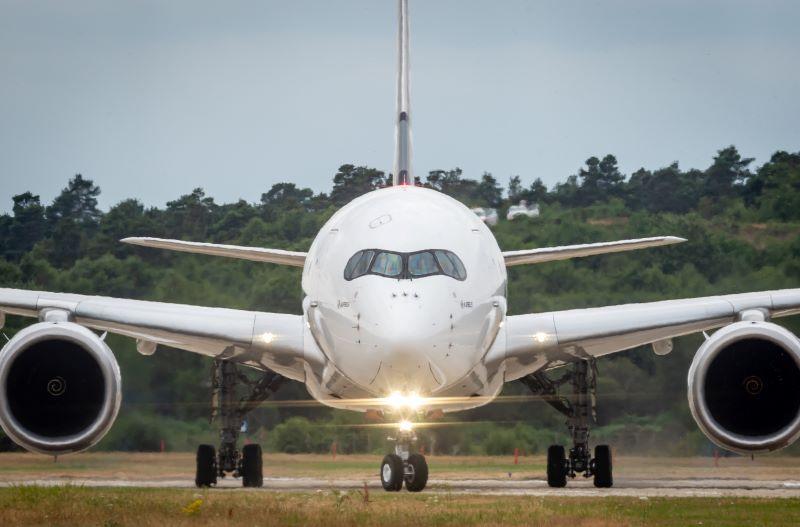
This week’s top air transport stories include news that Airbus will increase monthly output of its A350 will to 10 aircraft per month in 2026 and China Eastern Airlines made deals totaling more than $2.5 billion at the China International Import Expo in Shanghai.
In manufacturer news, Airbus confirmed Nov. 8 that monthly output of its A350 will increase to 10 aircraft per month in 2026. The manufacturer also specified the target to bring the A220 up to 14 aircraft per month—a rate now also to be achieved within the next three years.
Days after a Russian-affiliated ransomware group claimed responsibility for a cyber breach, Boeing confirmed a cyberattack was affecting Global Services operations—online, at least.
A modified Cessna Citation VII business jet to be used as a flying testbed for a novel wing design has taken off for the first time, Airbus UpNext—the airframer’s innovation arm—announced. Departing Toulouse airport Nov. 6, the aircraft marked the beginning of the first phase in the test campaign. The Citation VII at the center of the Extra Performance Wing demonstration program will eventually be transformed into an uncrewed aircraft. The wing will be flight-tested remotely.
Tier 1 aerostructures supplier GKN Aerospace has strengthened its long-term partnership with GE Aerospace through an agreement that includes new technology insertion, fan case production and assembly, and repair of high-volume engine structures.
In airline news, China Eastern Airlines has deals totaling more than $2.5 billion at the China International Import Expo in Shanghai, one of the largest procurement exhibitions in the world. The Shanghai-based carrier signed a total of 14 agreements with 13 suppliers from nine countries—mainly in the areas of engines, maintenance and services.
Air New Zealand plans to suspend two international routes next year and is considering leasing more aircraft in response to engine availability issues. The major driver of the changes is the latest problems identified with Pratt & Whitney geared turbofan (GTF) engines, which necessitate a revised maintenance and inspection program. A lack of spare engines will cause major disruptions to several airlines.
Taiwan’s EVA Air is set to make the Airbus A350-1000 a major part of its widebody replacement plans, after revealing an order for this type in addition to a significant A321neo order. The carrier filed a brief stock exchange announcement on Nov. 7 outlining a purchase deal for 18 of the largest version of the A350 and 15 A321neos.
Hainan Airlines agreed to lease three Airbus A320neos and three Boeing 737-8s from China Development Bank Financial Leasing (CDB Leasing), as the carrier ramps up capacity for its 2024-25 winter-spring schedule.
Ryanair Group CEO Michael O’Leary has forecasted that capacity constraints will persist across Europe for the foreseeable future, pushing air fares higher, driven by such factors as industry consolidation, aircraft delivery delays, and supply chain issues. The projection came after the Irish airline group reported an 11% growth in traffic, reaching a record 105.4 million passengers in the six months to Sept. 30, with average air fares seeing a substantial increase of 24%.
Uzbekistan-based startup Air Samarkand received its first Airbus A330-200 and expects its second aircraft—an A321—to arrive on Nov. 9 or 10. The airline also plans to receive three more aircraft before the end of 2023, which are likely to be a mix of A321ceos and neos. The arrival of the aircraft is a prerequisite for issuing an air operator’s certificate. Air Samarkand expects to gain approval and start flying within a month.
During the 2023 third quarter (Q3), three of Europe’s major airline groups have all shown record-high financial results exceeding the same period in pre-pandemic 2019.
In regulatory news, the U.S. Department of Transportation (DOT) made its first formal move addressing flight reductions at Amsterdam Schiphol Airport (AMS) by requiring Dutch carriers to file schedules for services to the U.S. after finding the Dutch government’s cuts to be anticompetitive and in violation of the U.S.-EU Open Skies agreement.
In sustainability news, the UK Civil Aviation Authority (CAA) has given the green light for Virgin Atlantic to perform a transatlantic flight powered by 100% sustainable aviation fuel (SAF), which is planned for Nov. 28.
